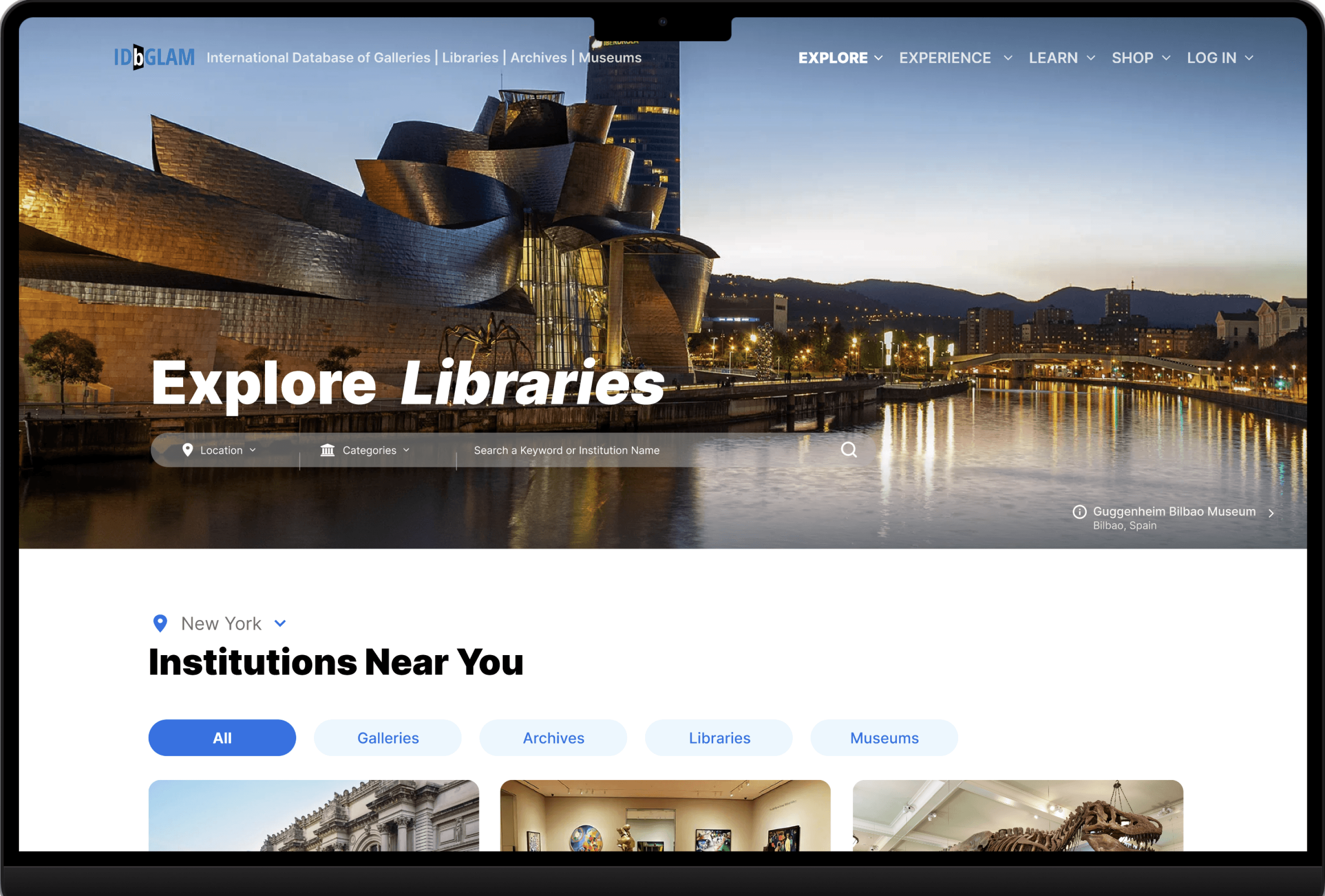Revamping content discovery to unlock engagement and revenue
ROLE
UX Researcher & Designer
TEAM
UX Researcher, UX Designer, Founder & CEO
DURATION
6 Weeks (Oct 24 - Dec 24)
TOOLS
Notion, Zoom, Figma,
G-Suite
RESPONSIBILITIES
Recruited participants, moderated interviews, developed research methods, analyzed data, facilitated client meetings, and contributed to visual design and content strategy.
Outcomes
100% User Endorsement
Users fully endorsed the new Explore homepage redesign, citing key features like Location Personalization and Institution Filters as major improvements for discovering institutions.
77.78% Boost in Form Completion
Users were more likely to fill out the new form, thanks to the streamlined, simplified design and improved navigation.
100% of GLAM Professionals Said ‘Yes’ to Hero Section Ads
Every GLAM (Galleries, Libraries, Archives, Museum) marketing professional endorsed the inclusion of hero section ads as it provides institutions with an opportunity to effectively advertise themselves to a wider audience.
Before
After
Context
What does IDbGLAM do?
Need for a User-Centered Redesign
The founder of IDbGLAM wanted to expand the website's reach beyond GLAM professionals to a wider audience. To achieve this, the user experience (UX) needed improvement, particularly in the Explore section (Homepage and Add Listing page), which required a more engaging and accessible redesign.
The goal was to design a visually appealing, user-friendly interface that encourages visitors to explore and contribute to the database, fostering a collaborative GLAM community.
Identified Issues
100% of users struggled with the Explore page, citing confusion, overload, and unclear purpose.
66% of users found the ‘Add Listing’ concept unclear and disengaging.
100% of users felt the site was outdated and untrustworthy, undermining its credibility for exploring institutions.
Simplify the design layout to focus on content and improve flow
Location Personalization: Allow users to view and change their location for tailored institution suggestions.
Institution Filters: Introduce filters to help users easily identify and search for specific types of institutions.
Contribution Encouragement: Add a prominent CTA for users to contribute listings if their local or favorite institutions are missing.
Exhibit Section: Create a dedicated section for users to easily discover exhibits, especially those near their location.
Create a Single Form to Enhance Efficiency
Single, Simplified Form: Consolidated the two forms into one to reduce unnecessary fields and streamline the process.
Improved Navigation: Added left-side tabs for easier access to specific sections without endless scrolling.
Clear Language: Replaced jargon with everyday terms to make the form more user-friendly.
Expandable Sections: Incorporated expandable fields for users to add multiple entries, offering flexibility for different institution needs.
Refine design to improve brand identity and user trust
Branding Elements: Introduced visual elements that clearly communicate the site’s purpose and what it offers, creating an immediate connection with users.
Enhanced Visual Design: Improved imagery and design to evoke a sense of delight and encourage users to explore further.
Engaging Copy: Used clear, engaging language in well-defined sections to help users understand the site’s offerings and mission.
Showcasing Smaller Institutions: Added a section to highlight smaller or lesser known GLAM institutions, providing them visibility and encouraging users to return for new content.
Process
Timeline
6 weeks
User Interviews
9 participants
3 iteration rounds
Iterative Design Approach
User Interviews
We conducted 3 rounds of moderated user interviews with a total of 9 participants. After each round, we refined the designs based on user feedback and presented the updated concepts to the client.
Round 1: Baseline interviews with 3 GLAM enthusiasts on then-current website and low-fidelity mockups.
Round 2: Interviews with 3 GLAM enthusiasts on mid-fidelity prototypes.
Round 3: Interviews with 3 GLAM professionals on high-fidelity prototypes.
We asked users about
During the interviews, users were repeatedly asked questions centered around the following themes:
Initial impressions of the site
Ease of understanding the site’s offerings
Confusing or unclear elements
Perceived organization of the site
How do these design changes unlock revenue potential?
As the long-term business goal is to turn the website into a for-profit platform, we explored ways to integrate marketing spaces into the design to generate initial revenue. To validate our approach, we interviewed 3 GLAM professionals with expertise in marketing.
Revenue Opportunities
100% of GLAM Professionals Said ‘Yes’ to Hero Section Ads for Their Institutions
Since this is the first thing users see upon entering the site, it provides institutions with an opportunity to effectively advertise themselves to a wider audience, encouraging visitors to explore their info pages and potentially redirecting them to their own websites.
33% of GLAM Professionals will Pay to Advertise their Exhibit in the Featured Section
Since the exhibit section isn’t as prominent as the hero section, institutions were hesitant to pay for advertising. However, they suggested that if exhibits had a dedicated section with prioritized content, it could encourage institutions to invest in advertising their exhibits.
Reactions & Feedback
User Testimonials
During and after the interview process, users expressed appreciation for the significant improvements in the design, highlighting how much easier it was to navigate the proposed solution. Here are a few:
“Museums are all about Culture, and I like how this new design feels modern and showcases relevant exhibits, events and news”
- GLAM Professional
“I find this website valuable for learning about new institutions and would love to use it once it’s live!”
- Anonymous Participant
Client Feedback
“I can see the effort you’ve all put into this, and I truly appreciate the time and dedication. It’s better than I expected, and it feels great to know others see its value too. I’m really satisfied with how it’s turned out!”
- Founder of IDbGLAM













